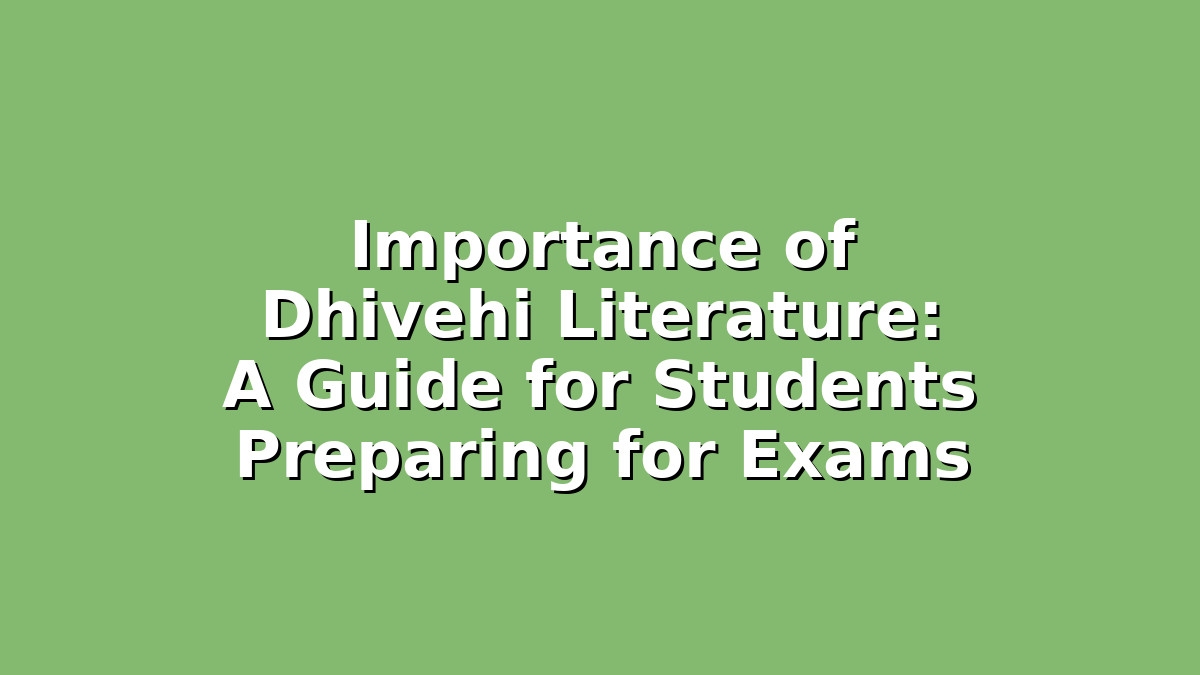Dhivehi literature is a rich and invaluable part of the Maldives’ cultural heritage. For students preparing for exams or seeking effective study strategies, understanding the importance of Dhivehi literature can not only improve academic performance but also deepen appreciation for their language and identity. This article explores why Dhivehi literature matters, how it can help you excel in your studies, and practical tips to engage with it meaningfully.
Understanding the Importance of Dhivehi Literature
Dhivehi literature encompasses the written and oral works in the Maldivian language, reflecting the history, traditions, and values of the Maldivian people. From ancient poems and folktales to modern novels and essays, it provides a window into the cultural soul of the Maldives. For students, this literature is more than just a subject to pass exams; it is a bridge connecting them with their roots and a tool for developing critical thinking and language skills.
Appreciating Dhivehi literature helps students build a strong foundation in their mother tongue, which is essential for effective communication and academic success. Moreover, literature often contains universal themes like love, courage, and morality, which resonate across cultures and time, helping students develop empathy and broader perspectives.
Section 1: Enhancing Language Skills Through Dhivehi Literature
One of the primary benefits of studying Dhivehi literature is the improvement of language skills. Reading poems, stories, and plays in Dhivehi enhances vocabulary, grammar, and comprehension – all critical for exams and everyday communication.
#### Study Tip 1: Active Reading and Note-taking
When studying Dhivehi texts, don’t just passively read. Instead, engage actively by underlining difficult words, making notes on themes, and summarizing paragraphs in your own words. This practice helps retain information and understand the text deeply, which is crucial for answering essay questions and writing assignments in exams.
#### Study Tip 2: Practice Writing in Dhivehi
Try writing short essays or summaries based on the texts you read. This will improve your writing skills and help you express ideas clearly. Writing regularly in Dhivehi also boosts your confidence, making exam essays less intimidating.
#### Study Tip 3: Use Audio-Visual Resources
Listening to Dhivehi poetry recitations, radio dramas, or watching plays can reinforce your learning. These resources expose you to correct pronunciation and intonation, essential for oral exams or presentations.
Section 2: Connecting Literature to Cultural Identity and Critical Thinking
Dhivehi literature is a reflection of Maldivian history, culture, and social values. Understanding these connections elevates your appreciation and can inspire critical thinking, a skill highly valued in exams and beyond.
#### Study Tip 4: Contextualize the Texts
When studying a poem or story, research its historical and cultural background. Knowing the time period, author’s life, and societal issues of that era can deepen your understanding and enable you to write more insightful answers.
#### Study Tip 5: Discuss and Debate
Engage in group discussions or classroom debates about themes in Dhivehi literature. Expressing your viewpoints and listening to others’ interpretations enhances critical thinking. It also prepares you for oral exams and helps you develop arguments for essay writing.
#### Study Tip 6: Relate Literature to Modern Life
Try to connect the messages or lessons in Dhivehi literature to contemporary issues. This not only makes your study more relevant but also encourages analytical thinking. For example, a folk tale about community cooperation can be linked to today’s emphasis on teamwork in school projects.
Section 3: Effective Revision Strategies for Dhivehi Literature Exams
Preparing for Dhivehi literature exams can be challenging due to the wide range of texts and analysis required. However, with the right revision techniques, you can study efficiently and confidently.
#### Study Tip 7: Create Mind Maps and Summaries
Organize your notes visually by creating mind maps that connect themes, characters, and plot points. Summarize each literary work briefly, focusing on key elements like setting, conflict, and message. This helps in quick revision before exams.
#### Study Tip 8: Practice Past Exam Questions
Reviewing previous exam papers helps you familiarize yourself with question formats and commonly tested topics. Practice writing timed answers to improve your speed and clarity under exam conditions.
#### Study Tip 9: Teach What You Learn
Explaining literary concepts to classmates or even family members reinforces your knowledge. Teaching others requires you to organize your thoughts clearly, which boosts memory retention and understanding.
Conclusion
Dhivehi literature is more than an academic subject—it is a vital link to Maldivian heritage and a powerful tool for developing language proficiency and critical thinking skills. For students preparing for exams, embracing Dhivehi literature with curiosity and active engagement can make a significant difference in both academic success and personal growth. By using the study tips outlined above, you can approach your Dhivehi literature exams with confidence and a deeper appreciation for the stories and poems that shape your culture.
Remember, every page you read is a step closer to mastering your language and understanding your identity. Keep practicing, stay curious, and enjoy the journey through Dhivehi literature.

Responses